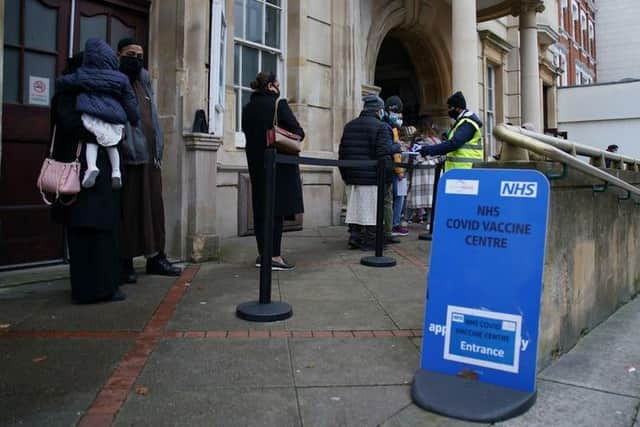Almost 20,000 people in Aylesbury Vale get Covid booster jab in three weeks
and live on Freeview channel 276
Almost 20,000 people in Aylesbury Vale have received a booster dose of the coronavirus vaccine in the last three weeks, new figures show.
It comes after scientists told the Government boosters are highly effective against hospitalisation for older adults, with second booster jabs for the most vulnerable ruled out for now.
Advertisement
Advertisement
Data from the UK coronavirus dashboard shows 19,971 people received a booster or a third vaccine dose between December 20 and January 9, bringing the total number of people in Aylesbury Vale to get a third shot to 113,674.


It means 63% of people aged 12 and over in the area have now had a booster, based on the number of people on the National Immunisation Management Service database.
Across the UK, 35.7 million people have now had a booster or third jab – 62% of over-12s.
Meanwhile, data from the UK Health Security Agency shows boosters are 90% effective against admission to hospital from the Omicron variant for the over-65s.
Advertisement
Advertisement
Protection for those with two doses dropped to about 70% after three months and to 50% after six months.
Professor Wei Shen Lim, the Joint Committee on Vaccination and Immunisation’s chairman of Covid-19 immunisation, said the data emphasised the “value of a booster jab”.
He said: “The current data show the booster dose is continuing to provide high levels of protection against severe disease, even for the most vulnerable older age groups.
“For this reason, the committee has concluded there is no immediate need to introduce a second booster dose, though this will continue to be reviewed.”
Advertisement
Advertisement
As the highly infectious Omicron variant continues to spread, scientists are also looking into the possibility of reducing the isolation period for Covid-19 cases from seven to five days, to reduce the staffing crisis across sectors including health, education and public transport.
Prime Minister Boris Johnson said England would stick to Plan B, but testing would be increased in key sectors.
Current Plan B measures include the wider wearing of face masks, the mandatory use of Covid passes for access to large venues and a return to working from home.
In Scotland, people are also advised to limit gatherings to no more than three households, while Wales and Northern Ireland have ordered nightclubs to shut, as well as introducing other measures on large gatherings and in hospitality settings.
Advertisement
Advertisement
Mr Johnson said: “We’ll act according to the science, as we always have.
“But what I would say to everybody is that Omicron is still out there, it’s incredibly contagious, everybody will know somebody who has had it – it can be pretty unpleasant."
He added a high proportion of those in intensive care units with Covid have not been vaccinated.
“It’s absolutely crucial that everybody gets their booster – it can make a huge difference," he said.